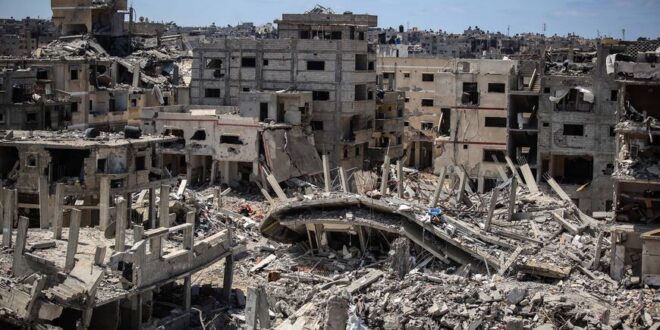Hamas’ formal reply comes a day after the UN Security Council passed a resolution backing the three-phase proposal.
The United States is evaluating the formal response Hamas submitted on the proposed cease-fire plan for the Gaza Strip, the White House said Tuesday.
The Palestinian militant group does not appear to have fully endorsed what US officials have described as an Israeli proposal to free the hostages and end the eight-month war.
Senior Hamas official Osama Hamdan told Beirut-based Al-Mayadeen TV that the group’s response on Tuesday to mediators Qatar and Egypt included “comments on the proposal.”
“Our response is a clear reaffirmation of our commitment to the cease-fire and withdrawal from Gaza, a commitment we have consistently upheld,” Hamdan said.
The foreign ministries of Qatar and Egypt said in a joint statement Tuesday they would “examine the response and coordinate with the parties concerned regarding the next steps.”
The deal on the table begins with a six-week pause in the fighting and the release of women, wounded and elderly hostages in return for Palestinian prisoners and a surge in humanitarian assistance. The second and third phases call for the release of male and deceased hostages, the full withdrawal of Israeli troops and the reconstruction of the devastated Palestinian territory.
In a briefing with reporters Tuesday afternoon, US national security spokesperson John Kirby said the United States had received the Hamas response hours earlier and was still in the process of evaluating it.
Kirby declined to comment on its substance but said, “It’s certainly helpful that we have a response.”
Hamas submitted its response a day after the UN Security Council passed a resolution backing the proposal laid out by President Joe Biden on May 31.
The militant group said in a statement Monday that it welcomed the resolution’s passage and was ready to cooperate on indirect negotiations over a permanent cease-fire. US officials have described the latest offer as nearly identical to Hamas’ own proposals.
Israel hasn’t publicly endorsed the deal, even as US officials insist the onus is on Hamas to accept it. Israeli Prime Minister Benjamin Netanyahu’s political survival depends on support from far-right members of his coalition who have vowed to bring down the government if Netanyahu agrees to any deal that doesn’t ensure Hamas’ total defeat.
Israel’s air-and-ground campaign in Gaza has killed more than 37,100 people, according to the Health Ministry in the Hamas-run territory, which does not distinguish between combatants and civilians in its tally.
The war was triggered by Hamas’ cross-border attack on Oct. 7, during which the militants killed some 1,200 people across southern Israel and took around 250 hostages.
More than 100 of them were released as part of a weeklong truce in late November. Of the 116 hostages who remain in Gaza, Israeli authorities believe at least 41 are dead.
Hamas’ response on Tuesday came as Secretary of State Antony Blinken returned to the Middle East in a four-country swing aimed at securing support for the US-backed proposal.
Speaking at a humanitarian conference in Jordan on Tuesday, Blinken described the cease-fire plan as the best way to address Gaza’s humanitarian crisis but said Israel can do more to alleviate the suffering.
The top US diplomat also announced more than $400 million in new humanitarian aid for Palestinian civilians living in Gaza, the West Bank and neighboring countries.
 Eurasia Press & News
Eurasia Press & News




